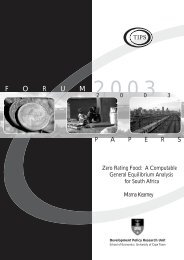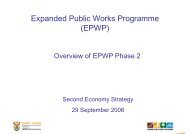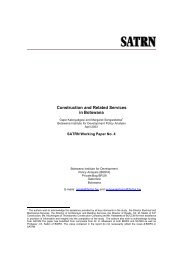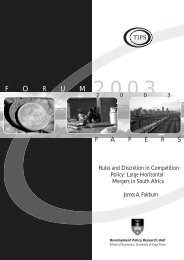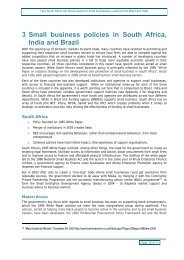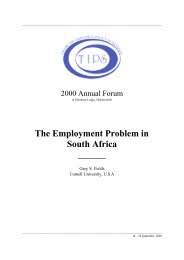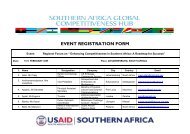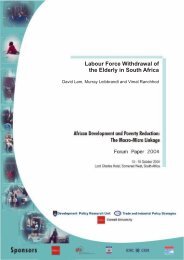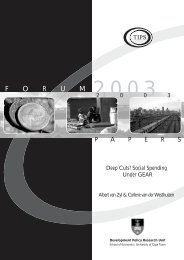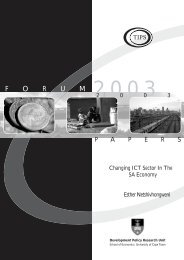Monitor Vol 39 08_Final_Nov08.pdf - tips
Monitor Vol 39 08_Final_Nov08.pdf - tips
Monitor Vol 39 08_Final_Nov08.pdf - tips
You also want an ePaper? Increase the reach of your titles
YUMPU automatically turns print PDFs into web optimized ePapers that Google loves.
Trade Policy<br />
28<br />
Trade & Industry <strong>Monitor</strong><br />
of CGE trade models is the lack of validation of the models’ predictions<br />
(Kraev and Akolgo, 2005). In other words, there is no way to tell whether<br />
or not the predictions match actual events based on historical data. CGE<br />
researchers typically respond to this criticism by stating that ex-post validation<br />
of their model is difficult because the income gains reported are<br />
measures of social welfare which are unobservable. They also argue that<br />
events outside the domain of the model affect or influence the actual behaviour<br />
of the global economy and so it would be inappropriate to expect<br />
the model’s predictions to match historical data (see for example, Whalley,<br />
2000). While these are valid arguments, they also apply to modelling<br />
methods used by the Real Business Cycle (RBC) researchers but have not<br />
prevented the validation of RBC models.<br />
Kehoe (2003) presents one example of an approach that could be used<br />
to validate CGE model predictions. It involves looking at historical data,<br />
sorting out stylised facts about the economies under investigation, and<br />
then comparing the models’ predictions on key macroeconomic variables<br />
with those in the data. For example, one can take a CGE model that was<br />
used to examine the impact of the Uruguay Round reforms and then run<br />
the simulations using only those reforms that have taken place so far and<br />
compare the results on changes in key variables with the actual changes<br />
we have observed. Valenzuela et al. (2005) suggest a similar but less comprehensive<br />
approach to model validation based on replicating observed<br />
price volatility in agricultural markets. They applied this to the GTAP model<br />
and found that it performs reasonably well for some countries (for example,<br />
Canada and Australia) and less so for others. In particular, the model<br />
tends to under-predict price volatility for net exporters and over-predict<br />
volatility for importing regions. They argue that the incomplete transmission<br />
of world price signals into domestic markets is responsible for this<br />
result, and that when this is taken into account the model does quite well.<br />
These validation efforts are welcome; they will ensure that CGE models<br />
capture certain facts about the trading system and increase the credibility<br />
of their results.<br />
5 Risks, Challenges and Way<br />
Forward<br />
Several African countries lack adequate research capacity to conduct analytical<br />
studies on key issues of interest to them in multilateral and regional<br />
trade negotiations, and so they often rely on the results of research carried<br />
out by international institutions and academics. When researchers<br />
present results that differ significantly in terms of both direction and magnitude,<br />
and there is no explanation as to why these discrepancies occur,<br />
policy-makers find themselves in a very difficult situation because they<br />
do not know how seriously to take the results. In particular, they do not<br />
know which of the studies is more accurate and relevant to their situation.<br />
Unlike academics and developed-country policy-makers who have many<br />
trade professionals to deal with technical issues, African policy-makers are<br />
often not in a position to evaluate these studies to determine how credible<br />
they are and how useful as bases for policy formulation. This can lead<br />
to one of two unattractive responses by African policymakers:<br />
(i) They may use the results of these studies for policy formulation<br />
even when they are not based on realistic assessments of the<br />
structure of their economies. This leads to wrong policy choices<br />
and has consequences for the ability of African countries to meet<br />
the development challenges facing them.<br />
(ii) They may completely disregard results and recommendations<br />
from these studies in policy formulation and base their judgment<br />
on political realities and popular attitudes towards trade reform.<br />
While this is understandable, it could also lead to wrong policy<br />
choices.<br />
Researchers therefore have a responsibility to ensure that policy recommendations<br />
are made on the basis of sound and objective assessment<br />
of the issues under investigation so that CGE models would be seen as<br />
an aid to policy formulation rather than a source of confusion to policymakers.<br />
Clearly, CGE models have an important role to play in economic<br />
policy formulation in Africa. When based on a sound theoretical framework,<br />
realistic assumptions and objective choice of parameters, they can<br />
provide policy-makers with very useful insights into the functioning of<br />
their economies as well as forming the basis for advice on the positions<br />
countries should adopt in multilateral trade negotiations. African countries<br />
should continue to pay attention to CGE models of trade policy but should<br />
not base their policy decisions solely on the results of existing models,<br />
since they do not take into account important features of their economies<br />
and there is so much uncertainty surrounding the parameter estimates<br />
used for the simulations. Combining the results of CGE models with those<br />
based on other frameworks will provide a better guide to policy decisions<br />
and minimise the risks of policy errors.<br />
There is a tendency for researchers to make recommendations to policymakers<br />
based on the results of CGE models with very weak econometric<br />
foundations, and this increases the propensity for decision-makers to<br />
make wrong policy choices. Given that African countries have very limited<br />
resources to address the enormous development challenges facing them,<br />
the cost of failures of this sort is very high. There is therefore the need<br />
for caution in the use of model results for policy decisions in the region<br />
(Gunter, Cohen and Lofgren, 2005).



